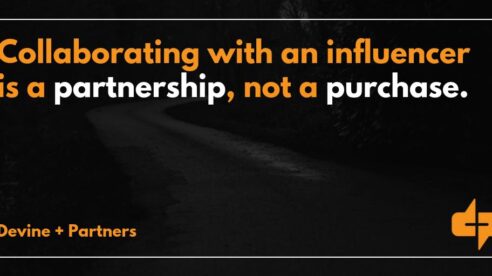Thoughts From VidCon Part 1: Avoiding the Trap of Influencer Marketing
Authors note: In July, I was among the lucky few (thousands!) of professionals to descend upon Anaheim, California for the 10th annual VidCon. VidCon is “the world’s largest celebration of online video and digital creators” – one part fan experience, one part creator summit, and one part industry conference that unites creators, brands, and innovative professional services agencies like D+P.
This is part one of a three-part series sharing what I learned from an action-packed VidCon week. I’ll unpack what I saw and heard, and explore how I think these learnings will impact our industry and our work for clients in the future. Come along!
Influencers, Content Creators, Vloggers, Oh My!

I had a singular mission when I attended VidCon, the world’s largest conference for online video and digital creators in July. That mission? Attend any and every session on the topic of “influencers.”
After launching our influencer engagement practice last year at D+P, our team has worked to build out this ever-changing practice area internally. This practice area fascinates me. The whole thing keeps me up at night. I think it’s complex, interesting, always changing, and I consume anything I can on the matter. So at VidCon, I sunk my teeth into dozens of sessions and panels. My biggest takeaway? How we approach these partnerships is crucial to their inevitable success (or failure.)
The Influencer Trap: Partnership, Not Purchases

One of the most interesting conversations I heard play out across different sessions at VidCon was the idea of partnership – particularly between brands and content creators or influencers. Today, even amidst rapid change, there is a tendency to approach new avenues in the communications world with the same principles we have used for many years.
For example: one might see an opportunity to work with an influencer who has
curated a specific and united audience as a great chance to, in a literal
sense, advertise their messaging. They treat an influencer’s page as a digital
billboard. They provide the approved copy and imagery, and ask the influencer
to share it. Maybe they even pay the influencer to do so. A direct transaction,
through and through.
This, my friends, is a terrible, terrible trap.
Collaborating with an influencer is a partnership, not a purchase. Steve Ruebel, chief media ecologist at Edelman, presented the company’s annual media forecast during an early session at VidCon and articulated this best. Influence alone without genuine advocacy is not only vapid, it’s a waste of your campaign dollars.
Another session led by the Outloud Group mirrored this sentiment. They drove home the idea that an influencer is not meant to mirror the brand voice. That’s not the point, right? The point is to empower the creators with key information and then let them do what they do best – create.
Paying simply to feature your product or message on an account without the authentic integration of the content creator’s style, voice, and genuine opinion will not harness the truly remarkable value of an influencer relationship.
Does this mean paid influencer campaigns are a bad idea? Absolutely not. In fact, engaging in a paid relationship with a content creator is often required – and it should be. Elevating a relationship to a paid level makes room for contracts that set clear expectations for both parties. It also enables brands to ask more directly for things that are helpful to your goals and measurement – namely, access to the analytics that can’t be seen without access to the backend of accounts.
So yes – pay your influencers. But in doing so, avoid the trap of a transaction. Do not just pay for the space on their page as if you’re buying a display ad in a newspaper or on a highway billboard. Pay instead for their creative skillset, their ability to create content in a meaningful way (that you can’t), their genuine advocacy, and their expertise in connecting with the audience your brand seeks to reach.

The Bottom Line – PR Pros Do It Best
There is a reason our team at D+P developed our practice as influencer engagement, not influencer marketing. Don’t lose sight of the fact that an influencer relationship is just that – a two-way partnership that can only blossom to its fullest potential if it feels authentic, and comes from a place of mutual value for both the brand and the creator.
And most of all, let the experts on relationship-building handle your influencer campaigns: your PR team. After all, our field has always been about good, honest relationship management. It’s just what we do.
—
If you are interested in learning more about the world of influencer engagement and how it might suit your organization’s goals, schedule a free consultation with our team. Drop us a line at resteasy@devinepartners.com


